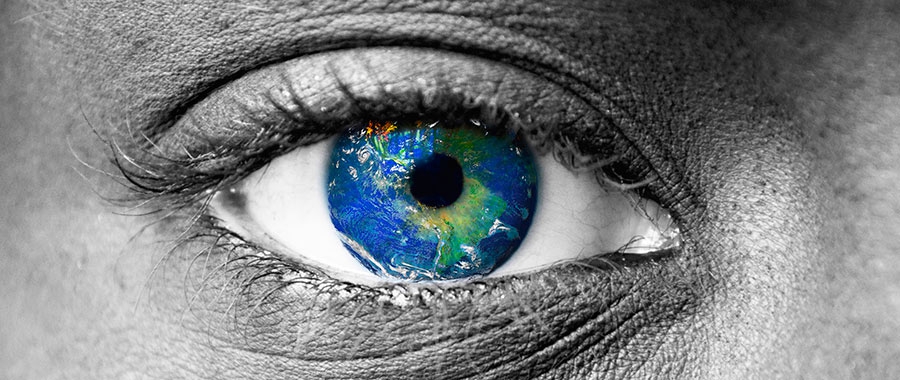The views expressed in our content reflect individual perspectives and do not represent the authoritative views of the Baha'i Faith.
For millennia, humans have dreamed of universal peace. We’ve wanted it for so long, and it hasn’t happened yet—which means lots of people have lost hope.
Sad, isn’t it? In many ways, even the future possibility of peace has become unthinkable—when was the last time you entertained the idea? As a result, some have concluded that world peace represents an unachievable utopian fantasy—that because human beings have a past history of war and violence, we’re doomed to bloody conflict forever. We’re warlike creatures, the thinking goes, so we’ll always have war.
This simplistic conclusion has led to hundreds of books, articles and scientific papers on the subject, many concluding that human beings have natural genetic programming that makes them aggressive, violent and combative.
The psychiatrist Sigmund Freud advanced the idea when he said that all humans have within us a reservoir of “aggressive energy” that naturally emerges as violence.
But this basic idea—human beings as inherently violent creatures—has been buttressed and supported by some scientists and philosophers for a very long time. One recent magazine essay in The National Interest titled “What Our Primate Relatives Say About War” maintained that we’ve warred with and killed each other for so long “Because we are human.”
Another article in the New Scientist journal asserted that warfare has “played an integral part in our evolution,” treating it as a given that war would always be with us. Even the respected research journal Science claimed in 2016 that “death in warfare is so common in hunter-gatherer societies that it was an important evolutionary pressure on early Homo sapiens.”
Here’s a one-sentence summary of that philosophy: war is inevitable and always will be, because it’s embedded in our DNA, in our basic human nature.
Do you believe that?
The Baha’i teachings don’t. Baha’is understand that peace isn’t just a pipedream—instead, Baha’is believe that Baha’u’llah’s new revelation has set in motion a practical, comprehensive peace plan now working towards the gradual and permanent eradication of warfare. Baha’is recognize the violent human impulses that have brought war about in the past, but also have faith that peace will one day become a global reality:
Universal peace is assured by Baha’u’llah as a fundamental accomplishment of the religion of God—that peace shall prevail among nations, governments and peoples, among religions, races and all conditions of mankind. – Abdu’l-Baha, The Promulgation of Universal Peace, p. 455.
Are you skeptical? Then you should know that millions of people around the world, from all continents, cultures and civilizations, are putting the Baha’i peace plan into action every day.
This represents something entirely new. For the first time in human history, a grassroots global force for peace has formed—a non-violent, unified mass movement to end war. You may not have noticed it yet, because its tactics and techniques are themselves quietly peaceful, but that movement—the Baha’i cause—has marshalled a dedicated army of peacemakers unparalleled in the narrative of our species.
So in this series of essays, let’s look at the Baha’i peace plan from as many possible viewpoints as we can, and try to comprehend and understand its scope, its major principles and its ultimate intent.
First, though, consider these important passages from the Baha’i teachings on the primary Baha’i principle of universal peace:
We have enjoined upon all mankind to establish the Most Great Peace—the surest of all means for the protection of humanity … for this is the supreme instrument that can ensure the security and welfare of all peoples and nations. – Baha’u’llah, Tablets of Baha’u’llah, p. 125.
God’s purpose in sending His Prophets unto men is twofold. The first is to liberate the children of men from the darkness of ignorance, and guide them to the light of true understanding. The second is to ensure the peace and tranquillity of mankind, and provide all the means by which they can be established. – Baha’u’llah, Gleanings from the Writings of Baha’u’llah, pp. 79-80.
O ye rulers of the earth! Wherefore have ye clouded the radiance of the Sun, and caused it to cease from shining? Hearken unto the counsel given you by the Pen of the Most High, that haply both ye and the poor may attain unto tranquillity and peace. We beseech God to assist the kings of the earth to establish peace on earth. …
O kings of the earth! We see you increasing every year your expenditures, and laying the burden thereof on your subjects. This, verily, is wholly and grossly unjust. Fear the sighs and tears of this wronged One, and lay not excessive burdens on your peoples. Do not rob them to rear palaces for yourselves; nay rather choose for them that which ye choose for yourselves. – Ibid., p. 253.
Every age requires a central impetus or movement. In this age, the boundaries of terrestrial things have extended; minds have taken on a broader range of vision; realities have been unfolded and the secrets of being have been brought into the realm of visibility. What is the spirit of this age, what is its focal point? It is the establishment of Universal Peace, the establishment of the knowledge that humanity is one family. – Abdu’l-Baha, Baha’i Scriptures, p. 274.
There is not one soul whose conscience does not testify that in this day there is no more important matter in the world than that of universal peace. – Abdu’l-Baha, Selections from the Writings of Abdu’l-Baha, p. 296.
With those powerful statements in mind, let’s explore the framework Baha’u’llah and Abdu’l-Baha—the prophet and founder of the Baha’i Faith and his son and successor—revealed for the establishment of this enormous, ambitious and ultimate human goal of universal peace. Please follow along in this series of essays on the Baha’i peace plan, and see if it can help you believe that peace is truly possible.
You May Also Like
Comments

















http://povodebaha.blogspot.com/2018/10/poderemos-alguma-vez-estabelecer-paz.html
(Bahá’u’lláh, Gleanings from the Writings of Bahá’u’lláh, p. 260)